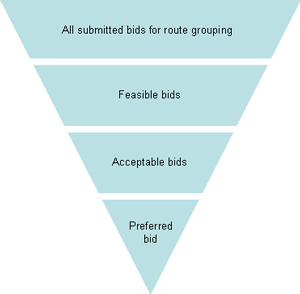Appendix: Glossary of terms
Definition of types of routes
More information is available from www.minedu.govt.nz (Home > NZ Education > Our education system > Primary & Secondary Education > School Operations > School Transport > School Transport homepage > School Bus Routes).
Route: An individual school bus route. There were 2089 routes in the 2008 bus tender process.
Daily school route: These bring eligible students to school at the start of each day, and take them toward home again at the end of each day. Eligible students are children under 10 years old who live more than 3.2km away from the nearest school, and children over 10 years old who live more than 4.8km away from the nearest school, where no suitable public transport is available.
Technology route: These provide transport to another school during the day so that year seven and year eight students can study technology.
Route grouping: A collection of routes associated with one logical geographic area (such as a town or school). All routes belong to a route grouping. A route grouping could be a single route, if there is no logical link with other routes. The Ministry defined the route groupings.
Cluster: Two or more route groupings. The choice and number of route groupings in a cluster is determined by the bus operator when they submit a tender. Clusters were sometimes also called “route grouping bundles”.
Definition of types of pricing bids
Individual bids: Bids may be submitted separately for individual routes.
Fleet rate bids/pricing: Where the bus operator chooses to bid the same price for two or more routes, to offer a more cost-effective price.
Composite bids: Bids made up of the lowest price submitted by bus operators for each route in a route grouping. Composite bids were assembled by the service agents so they could make comparisons with other route grouping bids. Composite bids were not formal joint venture arrangements between bus operators.
Cluster pricing: Bus operators bid for two or more route groupings (a route grouping cluster) with a single price.
Bid filtering process for route groupings
 |
Can be fleet bids (one rate for all routes in grouping). |
Feasible bids are:
|
|
Acceptable bids are:
|
|
| The preferred bid is the acceptable bid with the lowest price and the highest qualification score. |
